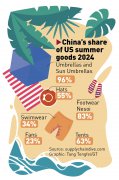Home>>
Beijing restaurant replaces US beef with Australian alternatives due to impact of Washington’s tariff policyBy Tao Mingyang (Global Times) 11:49, June 04, 2025
An America-themed restaurant in Beijing told the Global Times on Tuesday that it has recently replaced American beef with more affordable Australian alternatives, citing cost pressures and declining supply stability of US imports. This offers another sign of the lingering impact of the US-provoked tariff war on the competitiveness of US products in the Chinese market.
A staff member of a branch of a restaurant famous for its American-style barbecue in Beijing said that it had stopped serving imported beef from the US starting from about one month ago due to the impact of tariffs.
In addition to cost pressures, the restaurant cannot find suppliers that currently provide beef imported from the US, and it had to switch to beef imported from Australia, the staff member told the Global Times.
While American beef had been considered slightly better in quality, it has lost the competitive edge to more affordable and good-quality Australian beef because of Washington's tariff policy, the staff member said, adding that many consumers have accepted the substitution without complaints.
Another branch of the restaurant chain in Beijing is also in the same situation, the Global Times has learned.
In addition to beef, American chicken feet have also been replaced with those from Brazil or Russia at a restaurant in Beijing due to rising prices after the US tariffs, CNBC reported. "American agricultural products have been vanishing from Chinese stores and restaurants and losing ground to other imports," the report noted.
The US government announced plans to impose an additional 10-percent tariff on products imported from China under the pretext of the fentanyl issue, effective from March 4, which followed an additional 10-percent tariff imposed by the US on products imported from China in February this year, the Xinhua News Agency reported.
In response, the Customs Tariff Commission of China's State Council said on March 4 that it would impose additional tariffs on certain products imported from the US, effective from March 10, including an additional 10 percent tariff on imported beef, per Xinhua.
The unilateral imposition of tariffs by the US undermines the multilateral trading system, increases the burden on American businesses and consumers, and erodes the foundation of China-US economic and trade cooperation, the commission said in a statement at the time.
Even though China and the US released a joint statement following economic and trade talks in Geneva and have moved to modify or remove some hefty additional tariffs on each other's products, the joint statement only covered tariffs announced on April 2 or after, which suggests that the beef tariff announced in March remains in place.
As US beef has been hit by tariffs, imports from other countries have reportedly gained extra market share in China.
For example, the Australian Broadcasting Corp reported on April 12 that the tariff war halted US beef exports to China, and Australia has filled the gap, citing an industry insider who said that Australia is now the lone supplier of high-quality white fat marbled beef to China.
Meanwhile, Australian businesses are eyeing greater cooperation with China. At the Global Trade and Investment Promotion Summit 2025 held on May 22 in Beijing, Vaughn Barber, chair of the China-Australia Chamber of Commerce, reaffirmed Australia's stance on enhancing business and trade cooperation with China.
"Our trade minister recently sent a very clear message. He said, and I'm quoting, 'We don't want to do less business with China. We want to do more business with China. We'll make decisions about how we continue to engage with China based on our national interests, and not what the Americans may or may not want. And that's consistent with the attitude of Australian companies that are very committed to the Chinese market'," he said.
Since implementing its unilateral tariffs, the US has not resolved any of its own problems. "Instead, these measures have seriously disrupted the order of the international economy and trade, and severely interfered with business operations and people's consumption," a Chinese commerce ministry spokesperson said on May 29.
The spokesperson emphasized that the tariffs have harmed others without benefiting the US itself, and that they have triggered significant domestic opposition within the US.
(Web editor: Tian Yi, Liang Jun)










